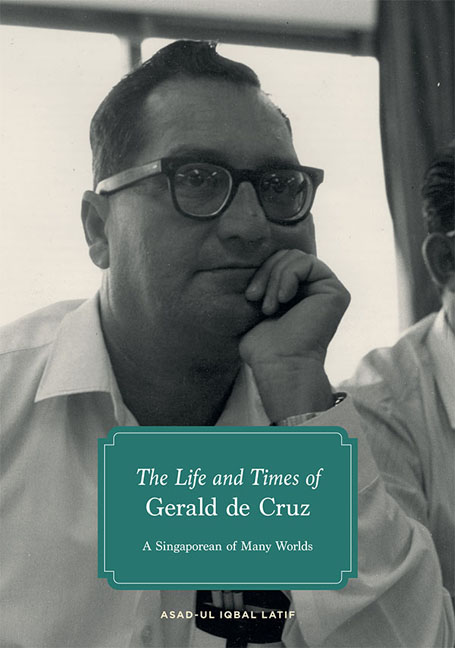Book contents
- Frontmatter
- Dedication
- Contents
- Preface
- Family Tree: Gerald Evelyn de Cruz
- 1 Don de Cruz de la Singapura
- 2 Childhood and Youth
- 3 The Japanese Occupation
- 4 The Communist Years
- 5 Going Abroad
- 6 The English Years
- 7 Return to Singapore
- 8 The Political Thinker
- 9 Friend of Labour
- 10 The Columnist
- 11 The Family Man
- Appendix
- Index
- About the Author
- Plate section
3 - The Japanese Occupation
Published online by Cambridge University Press: 19 May 2017
- Frontmatter
- Dedication
- Contents
- Preface
- Family Tree: Gerald Evelyn de Cruz
- 1 Don de Cruz de la Singapura
- 2 Childhood and Youth
- 3 The Japanese Occupation
- 4 The Communist Years
- 5 Going Abroad
- 6 The English Years
- 7 Return to Singapore
- 8 The Political Thinker
- 9 Friend of Labour
- 10 The Columnist
- 11 The Family Man
- Appendix
- Index
- About the Author
- Plate section
Summary
A week before the British surrendered Singapore to the Japanese on 15 February 1942, Gerald de Cruz, who was working as a reporter for The Straits Times, covered the arrival of the last British convoy. Part of it consisted of a group of Sherwood Foresters Anti-Tank Gunners. They looked extremely miserable. He asked one of their officers why. He said that although they were an anti-tank regiment, the ship in the convoy that was carrying anti-tank guns had been diverted around the Cape of Good Hope to the Middle East. So here they were, an anti-tank regiment without anti-tank guns. Although they had handled rifles many years ago, they were being given rifles and sent to the front line. The reality sank into the young reporter: The Far East was expendable, but not the Middle East. So much for Singapore being an Impregnable Fortress. He decided that,
we cannot depend on other people — white man, black man, yellow man, whoever it might be — to look after us; we must look after ourselves. You see, this is our country and we've got to rule ourselves. And even if we make a mess of it, that's our mess. Because I could see then, when it came to the crunch, we were very low on the list of priorities. Naturally the British people had to defend their islands first — first priority; Europe second — second priority; Middle East third — third priority. Far East — far down on the list of priorities.
That moment of realization saw the birth in de Cruz of nationalism and socialism, followed soon after by the need for armed resistance to the Japanese.
- Type
- Chapter
- Information
- The Life and Times of Gerald de CruzA Singaporean of Many Worlds, pp. 19 - 31Publisher: ISEAS–Yusof Ishak InstitutePrint publication year: 2015

